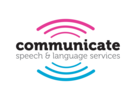
Dysphagia (feeding and swallowing)
The information here is written partly to assist professionals who are making referrals.
Dysphagia is the medical term for swallowing difficulties.
If a medical professional has requested Dysphagia support from us for a child or young person with feeding/swallowing concerns, you may find this information useful.
Referrals for Dysphagia Support
Communicate SLT will only accept referrals for dysphagia support from a medical professional such as a GP, Consultant or Specialist Nurse. It would be usual to receive this in the form of a letter, but we will work with the referrer to obtain the information we need to begin the process if this is not possible.
We also need a Request for Service for the child or young person and Communicate SLT will support the completion of this Request for Service where needed.
Referral criteria
Referrals for dysphagia are accepted where the child or young person:
- Is non-oral and requires oral stimulation advice.
- Is fed non-orally e.g. gastrostomy tube, nasogastric fed and is ready to start eating foods.
- Has swallowing difficulties e.g. choking, recurrent chest infections, weight loss, persistent coughing.
- Has a medical condition that affects eating and drinking and there has been a change in these skills.
- Has acquired a medical condition that has caused a change in eating and drinking skills.
If professionals are uncertain about whether a Request for Service meets this criteria, they can contact our team to ask for advice. Please email slt.halton@communicate-slt.org.uk, adding the word Dysphagia in the subject field to help us to manage our inbox efficiently.
Requests for service are not accepted for:
- A child under 12 months or developmentally less than 12 months old and who has no medical conditions, eats solids but may gag on solid foods.
- A child who only eats a small variety of food, is selective with foods and/or may refuse to eat certain food e.g. vegetables.
- A child who drinks more milk than recommended for their age, resulting in them eating less solid foods.
- A child who has a tongue tie but can eat a range of textures.
- Children with an eating disorder associated with a psychological diagnosis e.g. anorexia.
When an inappropriate Request for Service is received, the referral agent is notified and advice is given about other local services / resources.
First contact
Due to the risk associated with dysphagia, please ensure that the contact details for the referrer are up to date, as we will attempt to make contact soon after the dysphagia need is identified.
Triage
Once we have confirmed that there is a need for dysphagia support, a triage appointment will be arranged for parents / carers to speak to a trained Speech and Language Therapist. This could be a telephone call, virtual call or a visit and is usually be within 2 weeks of the need being identified.
Once the triage appointment has been carried out, the child or young person may be discharged from the dysphagia pathway, or an assessment scheduled for a future date.
Assessment
Where possible, assessments will take place in the child / young person’s home or educational setting so that the Speech and Language Therapist can observe their typical feeding environment.
Once an assessment has been carried out, the child or young person may be discharged from the dysphagia pathway, or a review scheduled for a future date.
Ongoing reviews
At the end of each contact a timescale for review will be agreed. A review appointment will be arranged for parents / carers to speak to a trained Speech and Language Therapist. This could be a telephone call, virtual call or a visit.
Once a review has been carried out, the child or young person may be discharged from the dysphagia pathway, or a further review scheduled for a future date.
Care plan
As part of the dysphagia support we offer, each child or young person will be provided with an individualised care plan. The care plan may be developed in collaboration with the multidisciplinary team, including dietitians, occupational therapists, and paediatricians also involved in the child / young person’s care.
This care plan will be shared, with parental consent, with partners and the educational team.
This care plan may include:
- Dietary modifications.
- Recommendations for safe feeding practices.
Please be aware that dysphagia services often have different timescales for accessing support. Referrers, parents and carers should be aware that an appointment focussing on dysphagia will not usually include a review for any ongoing speech, language or communication needs or support. For this reason, discharge from the dysphagia pathway will have no impact on other speech, language and communication pathways.
